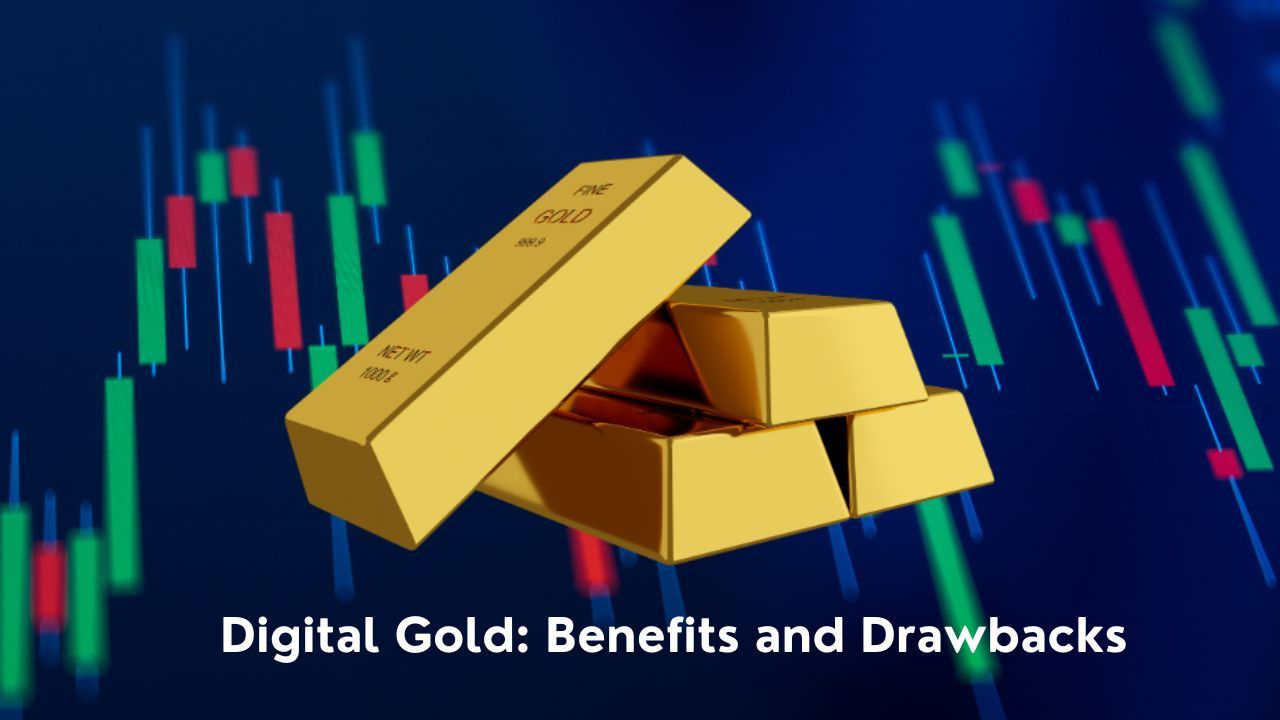What Is Digital Gold?
- Digital gold is a modern investment option that allows individuals to invest in gold electronically. This form of gold investment provides the benefits of traditional gold investment without the hassle of physical storage and security concerns. Investors can buy, sell, and accumulate gold in digital form, often with a few clicks on their smartphones or computers. This innovation combines the timeless appeal of gold with the convenience of digital technology, making it an attractive option for both seasoned investors and those new to the world of precious metals.
Secure Storage:
- One of the most significant advantages of digital gold is the secure storage it offers. Unlike physical gold, which requires safekeeping in vaults or lockers, digital gold is stored in secure, insured vaults by the service provider. This ensures that the gold is protected from theft, damage, or loss. Companies offering digital gold often partner with trusted custodians to provide high levels of security, ensuring peace of mind for investors.
No Lower Limit on Investment:
- Digital gold democratizes gold investment by eliminating the need for substantial initial capital. Traditional gold investment often requires a significant outlay, which can be a barrier for many individuals. However, digital gold allows investments as low as Rs. 1 or equivalent in other currencies. This accessibility encourages more people to invest in gold, regardless of their financial situation, and enables incremental investment over time.
Use as Collateral:
- Digital gold can be used as collateral for loans, providing an additional benefit for investors. Financial institutions are increasingly recognizing digital gold as a valid form of security, similar to physical gold. This means that investors can leverage their digital gold holdings to secure loans, providing liquidity without needing to sell their gold. This feature makes digital gold a versatile financial instrument, useful for both investment and financing purposes.
Ease of Exchange:
- The ease of buying and selling digital gold is another compelling feature. Transactions can be completed quickly through online platforms or mobile apps, making the process of investing in gold seamless and efficient. Unlike physical gold, there is no need for verification, transportation, or physical exchange, which can be time-consuming and costly. The ease of exchange also ensures that investors can react swiftly to market changes, buying or selling gold as needed.
Genuineness:
- Digital gold is backed by real, physical gold stored in secure vaults, ensuring its genuineness. Each unit of digital gold corresponds to a specific amount of physical gold, typically stored in a 24K 999.9 pure gold form. Reputable digital gold providers undergo regular audits to ensure that the amount of digital gold sold is fully backed by physical gold reserves. This transparency and guarantee of authenticity provide confidence to investors, knowing that their investment is genuinely backed by precious metal.
Advantages & Disadvantages:
| Advantages | Disadvantages |
|---|---|
| Secure storage without personal effort | Dependent on digital platforms |
| No lower limit on investment | Potential for cyber threats |
| Can be used as collateral | Limited physical access |
| Ease of buying and selling | May incur service fees |
| Guaranteed genuineness | Subject to market risks |
| Convenient and accessible | Regulatory differences across regions |
Conclusion:
- Digital gold represents a significant advancement in the way people invest in gold. By combining the intrinsic value of gold with the convenience and accessibility of digital platforms, it offers a modern, secure, and flexible investment option. Whether you're looking to diversify your portfolio, secure a loan, or simply invest in gold without the hassles of physical ownership, digital gold provides a compelling solution. As with any investment, it's important to understand the features, benefits, and risks to make informed decisions.
Also Read Our More Articles :
- 2024-25 में सोना खरीदने के लिए 5 सबसे सस्ते देश
- Understanding Different Types of Gold Jewellery
- Various Terms in a Gold Loan Agreement
- Gold Loans for Beginners: Apply Online Process & Eligibility
- Gold Loan or Personal Loan - Which is Better
- Gold and silver are money
- MMTC-PAMP: Your Trusted Partner for Gold Investment
- Why Central Banks Hold Gold Reserves
- How to Calculate Gold Jewellery Making Charges: Calculation & Key Factors
FAQs:
What is digital gold?
- Digital gold is a form of gold investment where individuals can buy, sell, and hold gold electronically. It is backed by physical gold stored in secure vaults and can be traded easily through online platforms.
How is digital gold stored?
- Digital gold is stored in secure, insured vaults by the service providers. These vaults are managed by trusted custodians who ensure the gold's safety and security.
Can I invest a small amount in digital gold?
- Yes, digital gold allows investments with no lower limit. You can start investing with as little as Rs. 1 or its equivalent, making it accessible to everyone.
Can digital gold be used as collateral for loans?
- Yes, many financial institutions accept digital gold as collateral for loans, providing liquidity without the need to sell your gold holdings.
What are the disadvantages of Digi gold?
Cons of Digital Gold:
- Nascent Market: The digital gold market is still in its early stages and undergoing evolution. As a relatively new concept, it lacks the historical track record of physical gold investments, which may make some investors hesitant.
- Tax Implications: One significant drawback is the tax burden. Like physical gold, digital gold is subject to long-term capital gains tax at 20.8% and short-term capital gains tax based on your income slab, which can affect your net returns.
- No Physical Possession: Unlike physical gold, digital gold does not provide the satisfaction of owning a tangible asset. This may be a downside for those who prefer to physically hold their gold for sentimental or security reasons.
What are the benefits of digital gold?
- Digital gold allows you to buy, sell, and hold gold entirely online, with secure storage provided by trusted vaulting services. One of its key advantages is accessibility—investors can start with small amounts, unlike traditional gold purchases that often require larger investments. Additionally, digital gold is highly liquid, meaning it can be easily sold for quick cash whenever needed, making it a convenient option for investors seeking flexibility.
Can I withdraw digital gold?
- Digital gold offers the flexibility to be purchased in multiple transactions of any denomination, allowing investors to accumulate gold over time. This feature makes it easy to build savings at your own pace. When required, you can conveniently redeem your accumulated digital gold as cash, which is directly transferred to your bank account, providing a seamless and hassle-free experience.
What is the future of digital gold?
- Digital gold has revolutionized gold investment by offering a modern, convenient alternative to traditional methods of storing gold at home or in a bank. With digital gold, your investment is securely stored in online vaults, eliminating the risks associated with physical storage. Additionally, it allows you to easily track and trade your gold digitally, offering a seamless and efficient way to manage your gold investments.
Is digital gold tax free?
- Is there any tax on digital gold? Yes, digital gold is subject to taxation. When sold after a holding period of more than 3 years, it attracts long-term capital gains (LTCG) tax at 20.8% (including cess), similar to physical and paper gold. If sold within 3 years, short-term capital gains (STCG) tax applies, and the tax is charged according to your applicable income tax slab. These tax rules make digital gold subject to the same treatment as other forms of gold investments.
How can I buy and sell digital gold?
- Digital gold can be bought and sold easily through online platforms or mobile apps. The process is quick and efficient, without the need for physical verification or exchange.
Is digital gold genuine?
- Yes, digital gold is backed by physical gold stored in secure vaults. Reputable providers undergo regular audits to ensure the amount of digital gold sold matches the physical gold reserves.
Are there any risks associated with digital gold?
- While digital gold offers many benefits, it is subject to market risks and potential cyber threats. Additionally, it is dependent on the reliability of digital platforms and may incur service fees.
How is digital gold different from physical gold?
- Digital gold offers the same intrinsic value as physical gold but eliminates the need for personal storage and security. It provides ease of transaction, lower investment thresholds, and can be used as collateral, unlike physical gold which requires safekeeping and may involve higher transaction costs.
Can I convert digital gold into physical gold?
- Some providers allow the conversion of digital gold into physical gold. However, this may involve additional costs and logistical arrangements. It is advisable to check the terms and conditions with the service provider.
What are the costs involved in investing in digital gold?
- Costs may include service fees for buying and selling, storage fees charged by the custodian, and potentially a premium over the market price of gold. It's important to understand these costs before investing.
Which is better, digital gold or physical gold?
- Digital gold offers a convenient option for short-term investments, with the added advantage of no storage hassles. It’s highly liquid, making it ideal for investors who value quick access to funds. On the other hand, physical gold is often considered a better long-term investment due to its tangible nature and traditional appeal. For those seeking liquidity and ease of transaction, digital gold is a good choice. However, risk-averse investors may prefer physical gold for its perceived stability and lower exposure to cyber risks.
We hope that you like this content and for more such content Please follow us on our social site and YouTube and subscribe to our website.
Manage your business cash flows and payable/receivables using our Bahi Khata App


